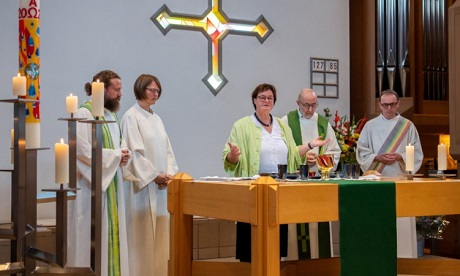A Swiss Catholic laywoman has allegedly concelebrated Mass to mark her retirement as a pastoral worker.
Monika Schmid, who who has been de facto administrator at a parish in the Swiss Catholic diocese of Chur in German-speaking Switzerland “presided” at the August 28 farewell Mass, preached the homily and concelebrated the Eucharist.
“As diocesan bishop, I have a duty to react to the events of these last few weeks (…) in the parish …,” said Bishop Joseph Bonnemain.
At the Mass, Schmid led the head of the procession, with a staff in hand as a symbol of the community’s shepherd. She was surrounded by two priests, a deacon and a theologian.
At the moment of the Eucharistic prayer – the text of which had been extensively revised – the group stood around the altar.
Schmid occupied the central place at the moment of the consecration. She also recited the Eucharistic prayer. A priest held up the host and the cup.
Earlier in the Mass, Schmid based her homily on the Gospel reading of the day: “For everyone who raises himself up will be humbled, and the one who humbles himself will be raised up”.
A video of the concelebration is circulating on social media.
At the end of the farewell ceremony, Schmid passed on her pastor’s staff to one of the two priests present, to whom she entrusted “her” parish.
Bonnemain says he will be opening a preliminary canonical investigation into these events.
“Because of the scope of these events, I deliberately chose not to act immediately. In such a situation, it is important to carefully evaluate an appropriate procedure,” he said.
“The complexity of the liturgical abuses that have taken place necessitates a preliminary canonical investigation.”
The incident occurred when a conference was held on “Sacramentality and the Church”, organised by the Swiss Bishops’ Conference and the Swiss League of Catholic Women.
The meeting’s theological and pastoral reflection raised the question of “the dispensation of sacraments by non-consecrated pastoral agents”, primarily women.
While reflections begun in 2020 consider “new forms of sacramental missions for lay pastoral agents, men and women, for example the celebration of baptisms or the anointing of the sick”, these don’t include presiding at Mass.
The Code of Canon Law is unambiguous about this.
“In the Eucharistic celebration deacons and lay persons are not permitted to offer prayers, especially the Eucharistic prayer, or to perform actions which are proper to the celebrating priest,” says canon 907.
One question concerns whether the presence of “concelebrating” ordained priests validates the Eucharistic when a lay person is also involved in reading the prayers.
It is possible the preliminary canonical investigation could place responsibility for the transgression on the ordained ministers.
“The results of this first investigation will form the basis for possible further measures.
“They will also show whether these are offences that should be dealt with by the dicastery for the doctrine of the faith and should therefore be reported to it,” Bonnemain says.
Source
